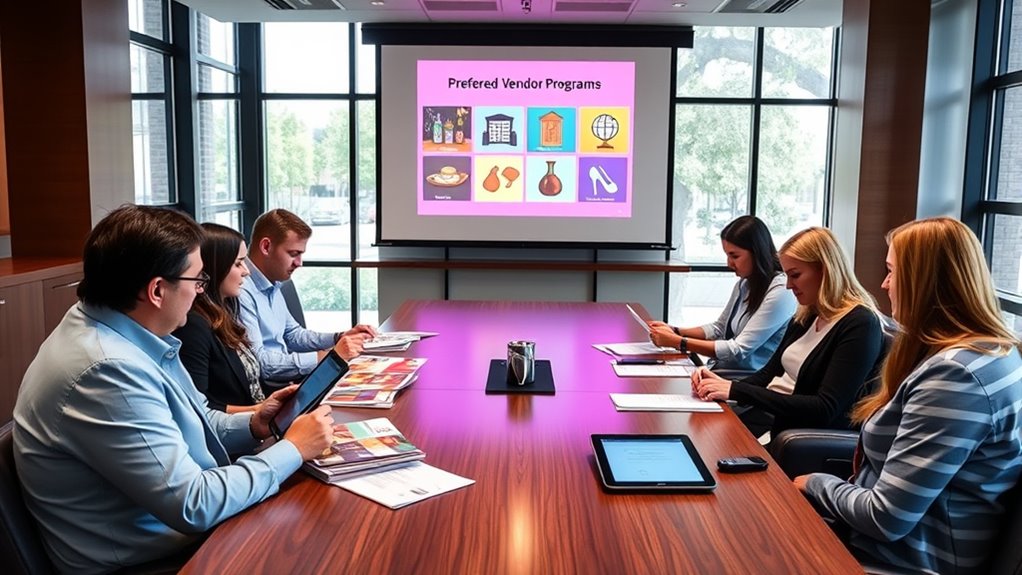Working with venues through preferred vendor programs simplifies your event planning by connecting you with trusted professionals who are familiar with the venue’s systems and policies. These vendors have proven track records, which helps reduce risks, save time, and guarantee quality services. Using preferred vendors also means better communication, streamlined coordination, and often negotiated rates. Continue exploring to discover how to make the most of these programs and ensure your event’s success.
Key Takeaways
- Preferred vendor programs streamline event planning by providing trusted professionals with proven track records.
- These programs facilitate better coordination and reduce vendor vetting time.
- Working with preferred vendors often includes access to negotiated rates and reliable service quality.
- Clear vendor contracts and proof of event insurance are essential to ensure smooth collaboration.
- Incorporating wellness options and reviewing policies enhances attendee experience and event success.

Are you wondering how to make your event planning smoother when working with venues? One of the key strategies is understanding and leveraging preferred vendor programs. These programs are designed to streamline the process, making your planning more efficient and less stressful. When you work with venues that have preferred vendor lists, you gain access to trusted professionals who have a proven track record of quality and reliability. This not only saves you time in vetting vendors but also helps guarantee that every aspect of your event runs smoothly.
A essential part of collaborating with preferred vendors is understanding the importance of vendor contracts. These agreements clearly outline each party’s responsibilities, deliverables, and expectations, reducing the risk of misunderstandings. When you sign vendor contracts with preferred vendors, you’re often working with providers who are familiar with the venue’s policies and requirements. This familiarity can lead to smoother coordination, fewer last-minute surprises, and a more cohesive event overall.
Vendor contracts clarify responsibilities, reduce misunderstandings, and ensure smooth coordination with familiar preferred vendors.
Event insurance is another critical element to consider. When working with venues and preferred vendors, it’s essential to confirm that everyone has adequate coverage. Event insurance protects you from unforeseen circumstances like property damage, injuries, or cancellations. Many venues require proof of insurance from vendors before they can set up or provide services. Having proper event insurance in place demonstrates professionalism and ensures you’re financially protected if something unexpected occurs. It also helps build trust with the venue, showing you’re prepared and responsible.
By working with a venue’s preferred vendors, you often benefit from established relationships that can facilitate smoother communication and quicker problem-solving. These vendors are familiar with the venue’s protocols, which means less back-and-forth and more focus on creating a memorable event. Additionally, many venues negotiate special rates or packages with preferred vendors, which can help you stay within your budget without sacrificing quality.
To make the most of preferred vendor programs, ask the venue for their recommended vendors early in your planning process. Review and negotiate vendor contracts carefully to guarantee all aspects of your event are covered, including insurance requirements. Confirm that each vendor has appropriate event insurance, and keep copies of all contracts and proof of coverage. This proactive approach not only safeguards your investment but also fosters a smoother working relationship with the venue and vendors. Incorporating juice cleanses and detox into your event wellness offerings can also promote health and vitality among attendees. Ultimately, understanding the role of vendor contracts and guaranteeing proper event insurance can make your event planning experience more seamless, enjoyable, and successful.
Frequently Asked Questions
How Do Venues Select Their Preferred Vendors?
Venues select their preferred vendors through careful venue selection, focusing on quality, reliability, and cost-effectiveness. They evaluate vendor relationships, considering past performance, professionalism, and how well vendors align with the venue’s standards and requirements. By building strong, trusted connections, venues ensure smooth event execution and maintain consistency. Your goal should be to demonstrate your value, dependability, and professionalism, making it easier for venues to include you in their preferred vendor list.
What Are the Benefits for Vendors in Preferred Programs?
Joining a preferred vendor program boosts your visibility and credibility with clients, as venues often prioritize exclusive vendors to guarantee quality. You benefit from vendor exclusivity, meaning fewer competitors, and program loyalty rewards like steady referrals and special promotions. This partnership helps you build long-term relationships, increase bookings, and establish a trusted reputation. Ultimately, being part of a preferred program can lead to sustained growth and more consistent business opportunities.
Are There Any Costs to Join a Venue’s Preferred Vendor List?
Like a knight of yore seeking a royal seal, you might wonder if there are costs involved to join a venue’s preferred vendor list. Generally, yes—there could be membership fees or costs involved. These fees help cover promotional benefits and exclusive access. While some venues waive these fees for top-tier vendors, it’s wise to inquire directly to understand what costs, if any, you’ll need to pay upfront.
How Do Preferred Vendor Programs Impact Pricing Negotiations?
Preferred vendor programs can influence your pricing strategies by giving you leverage in negotiations. When you’re on the preferred list, venues might be more open to flexible pricing or added perks, knowing you’re a trusted partner. Use negotiation tactics like highlighting your value and long-term partnership potential. However, stay aware that some venues may have fixed rates, so understanding the program’s impact helps you better plan your negotiations.
Can Vendors Be Part of Multiple Venue Preferred Lists Simultaneously?
Yes, vendors can be part of multiple venue preferred lists simultaneously, but vendor exclusivity and listing limitations often apply. Venues may restrict how many preferred vendors they list to maintain exclusivity, which can limit your opportunities. It is crucial to check each venue’s policies, as some may impose restrictions to ensure quality and consistency, while others allow multiple listings, giving you broader exposure across different venues.
Conclusion
Partnering with venues through preferred vendor programs can streamline your planning and guarantee top-quality services. Did you know that venues with established preferred vendor lists see a 25% higher client satisfaction rate? By working with trusted vendors, you not only simplify logistics but also boost your event’s success. So, take advantage of these programs to create memorable experiences and build strong industry relationships—your future events will thank you!









